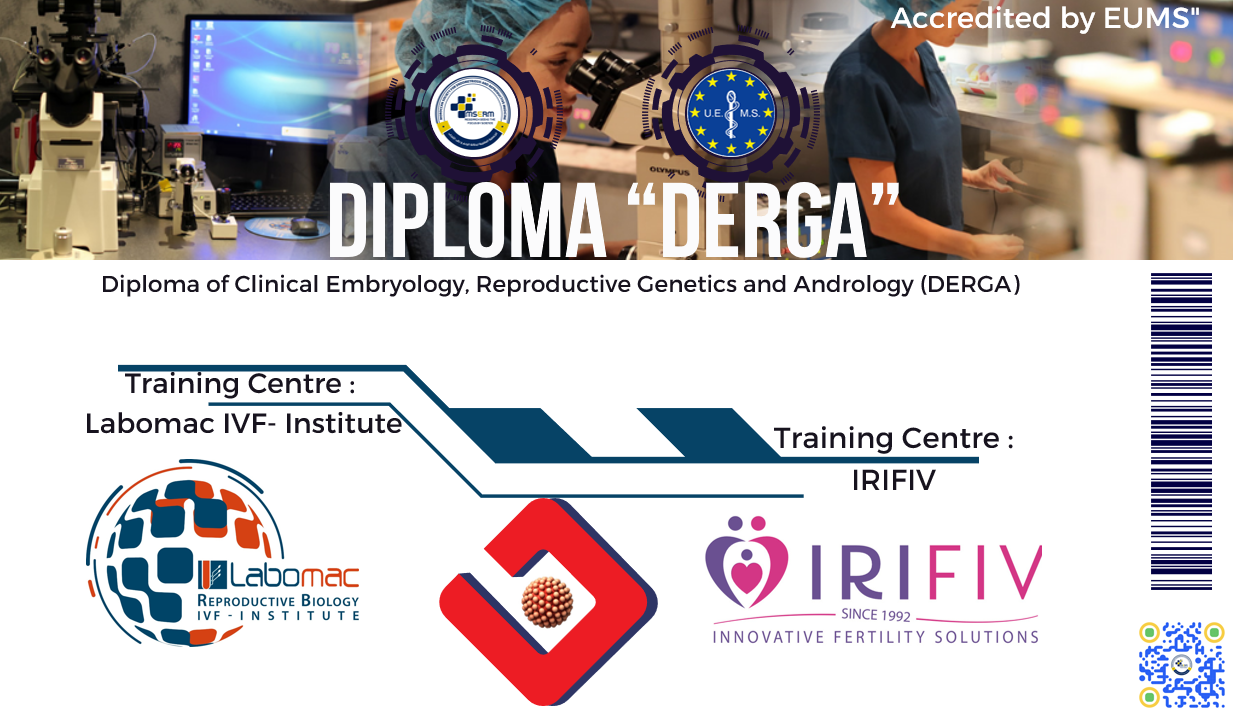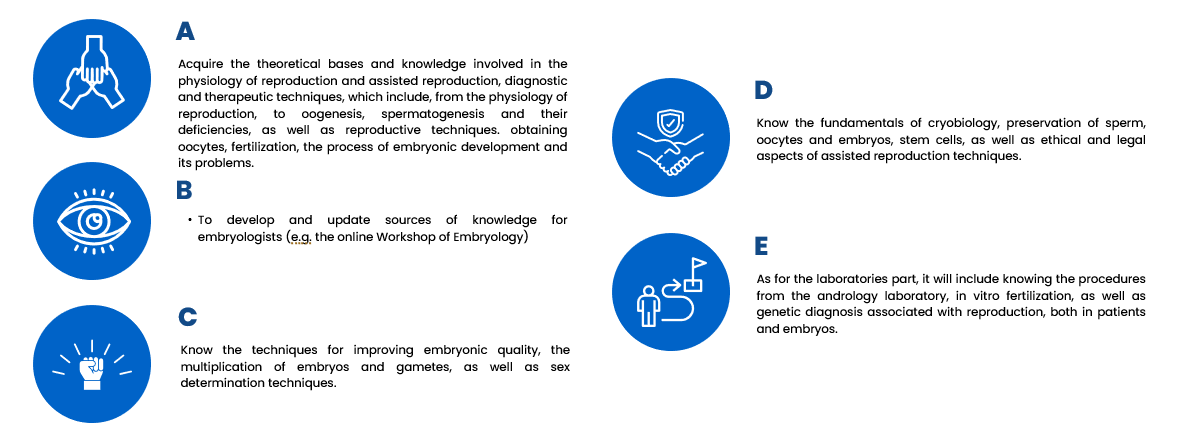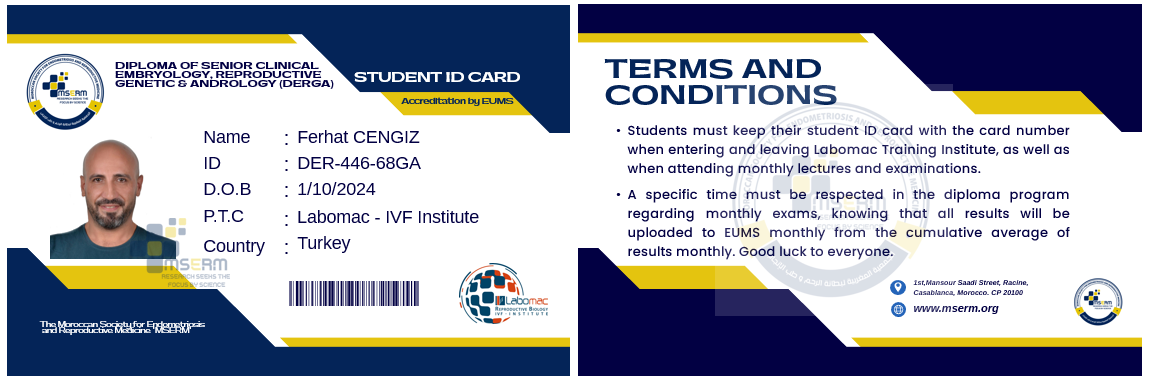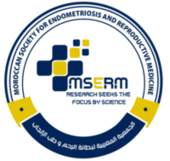
General Data
• Academic year: Academic year 2024/2026
• Type of course: Diploma of Clinical Embryology, Reproductive Genetic & Andrology (DERGA)
• Duration: 2 Years
• Certificate: MSERM Medical Society
• Dedication: 400 Hours
• Schedule: at your own pace
• CPD Credits: 60.00 ECTS Credits
• Pre-registration for the course: Until 10/JUL/2024
• Start date: 1th, OCT 2024
• End date: 10th, OCT 2026
• Registration: € 4,100 (public price amount)
Eligibility:
Master’s degree in life sciences, Zoology, biochemistry, microbiology, applied microbiology, biotechnology, genetics, molecular biology, Clinical Embryology, Ph.D, MBBS, MD, BDS, BVSc
• Admission requirements: Graduates in Biology, Pharmacy, Biochemistry, Veterinary Medicine and related degrees).
• Modality: Online or Attend in person.
• Place of delivery: Training Centre : Labomac IVF- Institute & IRIFIV ( International coaches online schedule)
• Schedule: Hybrid.
MORE INFORMATION:
• 1st,Mansour Saadi Street, Racine, Casablanca, Morocco. CP 20100
• Email: [email protected]
• Tel: +212 6 69 85 62 55
Course Objectives
There is a considerable increase globally in the need for assisted reproduction techniques by the general population, often related to the delay in the maternal age at which conception is intended, as well as in lifestyle habits and other factors. of a genetic and environmental nature. In response to this need, the number of patients waiting to receive treatment for their sterility or infertility situation has also grown, as well as the increase in assisted reproduction centers and, therefore, requiring highly trained professionals in reproductive medicine.
Diploma DERGA
In the Diploma DERGA on the Theoretical Basis and Laboratory Procedure in Assisted Reproduction at the IRIFIV CENTRE, 44 professionals from different fields participate, coming from the prestigious Labomac IVF- Institute, All of them have extensive clinical, teaching and more than two decades of research experience to train the students of the Diploma DERGA on the Theoretical Basis and Laboratory Procedure in Assisted Reproduction with the most up-to-date and complete teaching materials, whether of recent graduates or professionals in the area, so that they offer their patients the best treatment according to their knowledge.
Advantages of taking the Diploma DERGA on the Theoretical Basis and Laboratory Procedure in Assisted Reproduction
Set Goals
1. Having the appropriate training to begin integration in laboratories focused on assisted reproduction, as well as in research centers related to the sector.
2. Avoid obsolescence in the topic of assisted reproduction thanks to this complete updated training on the most recent findings and procedures on the subject.
3. Being able to make it compatible with professional activity, thanks to the hybrid nature of the Diploma DERGA.
Objectives “SIG-E” Embryology
– To organize and promote educational activities, and disseminate the latest high-quality research related to Clinical Embryology for Reproductive Scientists and Clinical Embryologists
– To promote, support, and develop the profession of Clinical Embryology
– To contribute to the development of the MSERM Certification for Embryologists
– To develop and update sources of knowledge for embryologists (e.g. the online Workshop of Embryology)
– To support young researchers, embryologists, practitioners, and all those with an interest in Clinical Embryology in their development and career path
– To date, the SIG has focussed on organizing Pre-congress Courses and Workshops in embryology, developing a SIG-E of embryology, producing consensus guidelines for laboratories in clinical embryology, and setting up a Certification for Embryologists. These have been valuable contributions to the community of clinical embryologists.
The Chairman SIG-E embryology board
Dr. Noureddine LOUANJLI – Morocco
Careers Goals

Course structure

Student ID Card

Methodology
•Expository Method/Theoretical classes: recorded speeches, with the explanation of the syllabus by the teachers, and the delivery of written material. The classes, along with their slide presentations, teachers’ comments and answers to students’ questions, are recorded, using the Powerpoint tool, which allows virtual assistance, as well as being able to refer back to the content given in class.
•Project-oriented learning (carrying out a project-work applying acquired skills). Bibliographic work is carried out on topics that contribute to comprehensive training. A report of the MSERM activities is prepared
•Tutorials, individualized attention is developed in which, above all, doubts are resolved and significant learning of the skills they have acquired is encouraged. The teacher acts as an academic guide, supporting the student, but always promoting autonomous learning.
Communication
The Diploma DERGA’s grade is made up of:
90% of the final grade is the weighted average of all the subjects, with the grade for each subject being:
“40% the grade obtained in the individual exam
” 60% of the grade obtained in the final Diploma DERGA’s exam:
10% of the final grade
” Bibliographic Research Work
*The Diploma DERGA will be approved having compulsorily passed all the modules, the final Diploma DERGA’s exam and the Work Bibliographic Research
Our Terms and Conditions
The Diploma DERGA Programme will comprise the following five compulsory part-time online distance learning modules.
Year 1
Fundamentals of Clinical Embryology (40 Credits) – This module builds a firm foundation in reproductive biology and the science of human reproduction that is fundamental to clinical embryology and assisted conception. The module covers the physiology, cellular and molecular biology and genetics of the processes of gametogenesis, fertilisation, embryo preimplantation development, implantation and pregnancy.
Additionally, the module covers reproductive endocrinology and discusses the causes and treatments of male and female subfertility and associated reproductive pathologies.
IVF and Embryo Culture (35 Credits)
This module will provide the student with a wide-ranging overview of the topics which are fundamental to embryology. The intention will be to build on students’ knowledge to provide an extensive and detailed comprehension of the running of an IVF laboratory and service.
Year 2
Micromanipulation (15 Credits) – This module focuses on the practices and genetic and epigenetic concepts of micromanipulation techniques, such as intracytoplasmic sperm injection (ICSI) and pre-implantation genetic testing (PGT). It provides students with the theoretical knowledge of the principles underpinning these intricate procedures, which are instrumental in treating many forms of infertility.
Cryobiology and Cryopreservation (15 Credits) – This module provides a comprehensive overview of the principles and practices of cryobiology and cryopreservation as applied to gametes, embryos and gonadal tissues. Students will explore the science behind these techniques and their use during assisted conception and for fertility preservation in patients at risk of fertility loss as a result of exposure to gonadotoxic treatments from genetic causes.
Ethics and Law for Embryologists (10 Credits)
This module will explore the issues surrounding assisted conception in terms of the law and ethics of the technologies available. will be emphasised as will the implications of the Code of Practice for embryologists. Patient issues will be explored such as confidentiality, patient contact, counselling and informed consent. Ethical, cultural and religious aspects and reactions to infertility treatments will also be discussed.
Learning and teaching
We ensure that students, regardless of their geographic location, are fully integrated into the academic fabric of the University of Leeds and feel connected with their fellow students. Our approach to teaching and learning is designed to be fully inclusive and geared towards fostering a strong sense of community and belonging among our students.
Conditions for admission to the Embryology Diploma
• Register for the diploma entrance exam for free, then register and pay the diploma fee of 4,100 euros
• The date of the entrance exams is Sunday, August 18, 2024 – a success rate in the entrance exam is 75% of the exam result, after which you will be notified to pay a registration fee via private email.
• After success and registration, please send all required documents in order to complete your registration successfully. Any missing document will remove you from registering in the diploma.
• Please wear training clothing throughout your studies, training, and exams
• A student card will be issued that contains your seat number for all monthly assessment exams
• Register your fingerprint when entering and leaving an institute. All information will be submitted to the Council of the European Union in order to gain attendance points.
• Commitment to the timing of exams, which is indicated in a monthly evaluation schedule
• Do not hesitate to ask us any question you want to ask us at any time via this email: [email protected]
